| Srl | Item |
| 1 |
ID:
075751
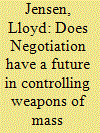

|
|
|
|
|
| Publication |
2006.
|
| Summary/Abstract |
Despite the heightened level of concern about weapons of mass destruction since 9/11, negotiations for strengthening the WMD nonproliferation regime have been somewhat less than productive. The fact that the material and technology for producing such weapons is also used for peaceful purposes helps explain the limited progress. Lack of trust, concern about equality and fairness as well as the tendency to use negotiations for ulterior purposes also make progress difficult. After considering these points, the article discusses some of the incentives and disincentives that have been used to influence positions on the nonproliferation issue and how paying attention to the needs and interests of the would-be proliferators might increase the chances of reaching mutually beneficial agreements.
|
|
|
|
|
|
|
|
|
|
|
|
|
|
|
|
| 2 |
ID:
075745
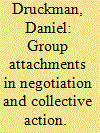

|
|
|
|
|
| Publication |
2006.
|
| Summary/Abstract |
The impact of group attachments on negotiating behavior is a theme (or variable) that runs through many articles published in International Negotiation. It is also a popular topic for research on groups reported in other outlets. This literature set in motion the analytical probe discussed in this article. Focusing attention primarily on ingroup-favoring biases, four questions are asked: What is the phenomenon? Why does it occur? How can it be reduced? Where is it manifest in a larger policy context within which negotiations take place? Highlighted in this essay are the prevalence of the bias, the variety of plausible explanations for its occurrence, the distinction between patriotic and nationalistic group attachments, and the connections between group loyalty, policy making, and collective action. The insights achieved also reveal a number of areas for further research. This topic is one example of the many research accomplishments that herald the birth and maturity of a field of study and practice. In this special issue, we take pause to document these accomplishments as we look forward to another decade of progress
|
|
|
|
|
|
|
|
|
|
|
|
|
|
|
|
| 3 |
ID:
075749


|
|
|
|
|
| Publication |
2006.
|
| Summary/Abstract |
What forms of U.S. intervention are likely to prove realizable and to be appropriate for facilitating the implementation of peace agreements and protecting human rights in Africa? The choices for action are certainly wider than the polar opposites of disengagement and large-scale military intervention. Because the United States can afford neither prolonged military hegemony nor the indulgence of neo-isolationism, it must find some form of creative engagement that fulfills its obligations to facilitate and protect in ways that are acceptable to both American and overseas opinion. Limited interests in Africa and the nature of public pressures leave little alternative to utilizing soft intervention approaches in most cases. Within the category of soft intervention, there appears to be a continuum of means leading to possible movement into muscular intervention. At one end, there is coercive diplomacy, which is associated with threats of military and economic sanctions; if these sanctions are actually used, the intervening state becomes involved in muscular intervention. At the other end is diplomacy associated not with threats, but with the promise of rewards. Between the two poles lies diplomacy that involves neither threats nor rewards (i.e., conciliation and mediation without the use of pressures and incentives). In real world contexts, third parties tend to apply mixed packages of non-coercive and coercive incentives, with coercive incentives becoming increasingly dominant as the costs of altering preferences and the intensity of conflict rise.
|
|
|
|
|
|
|
|
|
|
|
|
|
|
|
|
| 4 |
ID:
075746
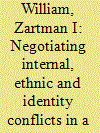

|
|
|
|
|
| Publication |
2006.
|
| Summary/Abstract |
How, under current conditions, do negotiators find a resolving formula that is enticing to the parties in internal conflicts and that lasts? The search for an answer about this process can take three paths: One that focuses on the context provided by the conflict itself, another that examines the content of the appropriate outcome, and a third that looks at the conduct of parties in their negotiating roles. A particular challenge comes from the internal and international reactions - primarily Islamic - to the encroachment of globalization into their area, where the challenge is to move the conflict from non-negotiable to negotiable. A wide range of conflicts will be used to illustrate the conceptual discussion.
|
|
|
|
|
|
|
|
|
|
|
|
|
|
|
|
| 5 |
ID:
075752
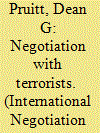

|
|
|
|
|
| Publication |
2006.
|
| Summary/Abstract |
Negotiation with non-ideological ethno-nationalist terrorists is more common and more successful than with other kinds of terrorists. Additional strategies for dealing with terrorists include combating, isolating, and mainstreaming. There are many arguments against negotiation with terrorists, but most of them do not apply to secret backchannel talks, which are usually the method of choice in first approaching these groups. The success of negotiation depends on the development of flexibility by both the terrorists and the authorities. These and other points are illustrated with case materials from the Northern Ireland peace process, and the analysis is extended, on a speculative basis, to negotiation with several Islamic terrorist groups.
|
|
|
|
|
|
|
|
|
|
|
|
|
|
|
|
| 6 |
ID:
075750
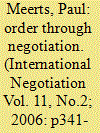

|
|
|
|
|
| Publication |
2006.
|
| Summary/Abstract |
The negotiation process can be a tool that generates order in international relations between states and international organizations. Order and structure are needed in a globalizing world of interdependencies and growing cleavages. The importance of international regimes in channeling and protecting negotiation processes is discussed. Regimes and interstate bargaining can only be effective if the main actors successfully balance their interests and activities. To create this equilibrium, extra-regime negotiations are as much needed as intra-regime bargaining, since negotiation is as much about situations as it is about structures, flexibility plus strength.
|
|
|
|
|
|
|
|
|
|
|
|
|
|
|
|
| 7 |
ID:
075747


|
|
|